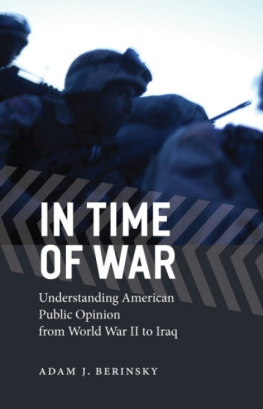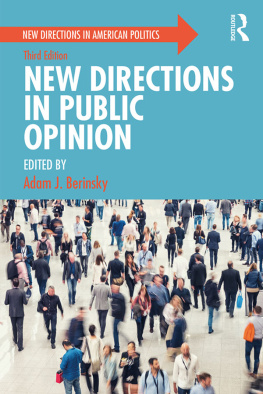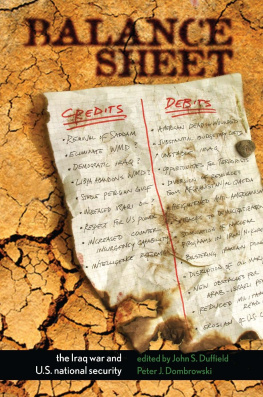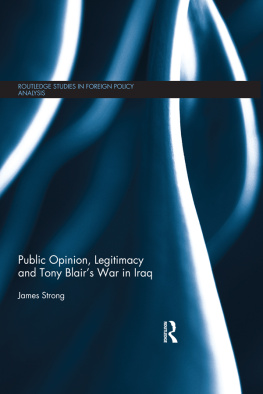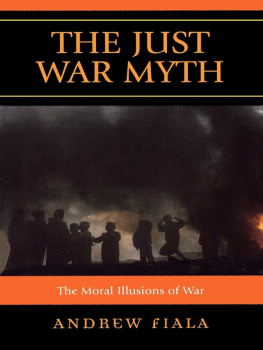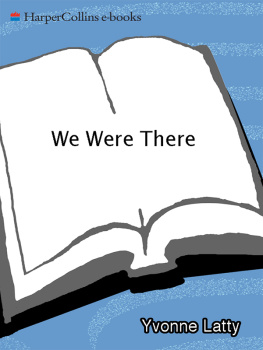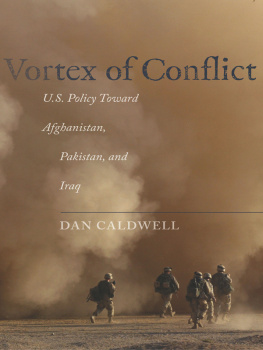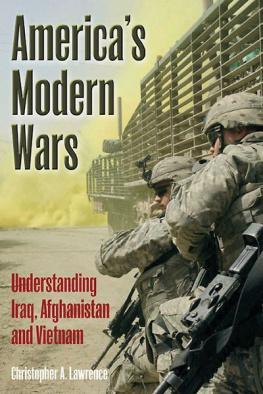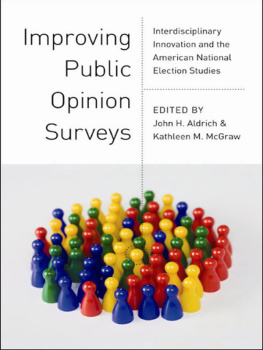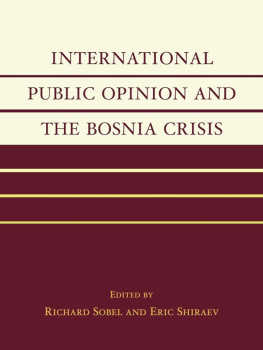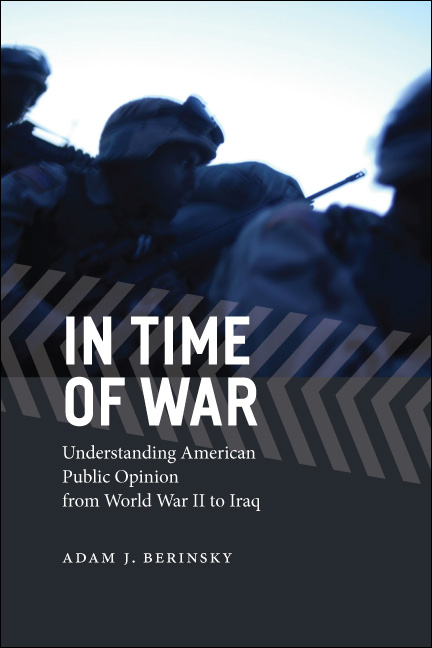In Time of Wa r
chicago studies in american politics
A series edited by Benjamin I. Page, Susan Herbst, Lawrence R. Jacobs, and James Druckman
also in the series:
Us Against Them: Ethnocentric Foundations of American Opinion
by Donald R. Kinder and Cindy D. Kam
The Partisan Sort: How Liberals Became Democrats and Conservatives Became Republicans
by Matthew Levendusky
Democracy at Risk: How Terrorist Threats Affect the Publi c by Jennifer L. Merolla and Elizabeth J. Zechmeister Agendas and Instability in American Politics,
Second Edition by Frank R. Baumgartner and Bryan D. Jones
The Private Abuse of the Public Interest
by Lawrence D. Brown and Lawrence R. Jacobs
The Party Decides: Presidential Nominations Before and Aft er Reform
by Marty Cohen, David Karol, Hans Noel, and John Zaller
Same Sex, Different Politics: Success and Failure in the Struggles over Gay Rights
by Gary Mucciaroni
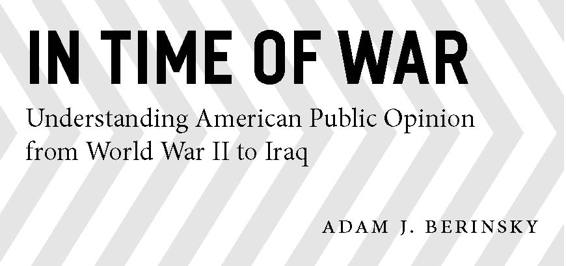
The University of Chicago Press chicago & london
Adam J. Berinsky is associate professor of political science at Massachusetts Institute of Technology.
The University of Chicago Press, Chicago 60637 The University of Chicago Press, Ltd., London 2009 by The University of Chicago All rights reserved. Published 2009 Printed in the United States of America
18 17 16 15 14 13 12 11 10 09 1 2 3 4 5
isbn- 13: 978- 0- 226- 04358- 6 (cloth)
isbn- 13: 978- 0- 226- 04359- 3 (paper) isbn- 10: 0- 226- 04358- 4 (cloth) isbn- 10: 0- 226- 04359- 2 (paper)
Library of Congres s Cataloging-in-Publication Dat a
Berinsky, Adam J., 1970 In time of war : understanding America n public opinion from World War II to Iraq / Adam J. Berinsky .
p. cm. (Chicago studies in America n politics ) Includes bibliographical references and index . isbn-13: 978-0-226-04358-6 (cloth: alk. paper ) isbn-13: 978-0-226-04359-3 (pbk.: alk. paper ) isbn-10: 0-226-04358-4 (cloth: alk. paper ) isbn-10: 0-226-04359-2 (pbk.: alk. paper )
War and societyUnited States. 2. Worl d War, 19391945United StatesPubli c opinion. 3. Korean War, 19501953Unite d StatesPublic opinion. 4. Vietnam War , 19611975United StatesPublic opinion .
Iraq War, 2003Public opinion. I. Title .
II. Series: Chicago studies in American politics . hm554.b475 200 303.6'60973dc2
2008053228
o The paper used in this publication meets the minimum requirements of the American National Standard for Information SciencesPermanence of Paper for Printed Library Materials, ansi z39.48- 1992.
To Deirdre, Benjamin, and Lil a
CONTENTS
List of Figures / i x List of Tables / xi i Acknowledgments / x v
Introduction: America at War / 1
part i. historical perspective Public Opinion and War: A Historical Perspective / 13 The Myths and Meaning of Public Opinion and World War II / 33
part ii. the structure of support for war The Calculation of Costs: An Innocent Public / 61 Partisan Structure of War Support: Events, Elites, and the Public / 85 Ethnic Groups: Attachments, Enmities, and Support for War / 127
part iii. public opinion and war: back to the waters edge Civil Liberties and War / 155 Elections during Wartime / 178
Conclusions / 207 appendix a: Description of Data and Weighting / 222 appendix b: Iraq War Casualty Survey Analysis / 229 appendix c: Congressional Record Content Analysis / 234 appendix d: Statistical Significance of Ethnic Variables / 246 appendix e: Relationship between Support for War and Support
for Restricting Civil Liberties / 251 appendix f: NES Analysis of Retrospective War Support / 256
Notes / 265 References / 309 Index / 327
FIGURES
2.1. Trends in support for the Korean War / 16
2.2. Trends in support for the Vietnam War / 21
2.3. Trends in support for the Gulf War / 23 2.4a . Trends in support for the Afghanistan War, 20012 / 28 2.4b. Trends in support for the Afghanistan War, 20067 / 28
2.5. Trends in support for the Iraq War / 32
3.1. Trends in opposition to making peace with Germans / 48
3.2. Trends in support for helping England and defeating Germany over staying out of the war / 49
3.3. Trends in support for using U.S. convoy ships to carry war materials to Britain / 51
3.4. Gender gap in support for helping England over staying out of the war / 54
3.5. Gender gap in opposition to peace with the German army / 54
3.6. Gender gap on support for taking an internationalist position aft er the war / 56
5.1. Parties and war rhetoric in Congress, 193845 / 89 5.2a. Evidence of polarization pattern, Gallup, November 1939: Approve of changes to neutrality law / 93 5.2b. Evidence of polarization pattern, OPOR, January 1941: More important to help England than stay out of war / 93 5.2c. Evidence of polarization pattern, Gallup, June 1941: Let Germany keep land in exchange for peace / 94 5.2d. Evidence of polarization pattern, Gallup, June 1941: Use U.S. navy to convoy ships to England? / 94
5.2e. Evidence of polarization pattern, Gallup, August 1941: Use U.S. Navy to convoy ships to England? / 95
5.3a. Evidence of mainstream pattern, OPOR, June 1942: Take active part in world aff airs after the war / 96
5.3b. Evidence of mainstream pattern, OPOR, June 1942: Do not make peace with Hitler / 96
5.3c. Evidence of mainstream pattern, Roper, March 1943: United States should take active role in international organization after war / 97
5.3d. Evidence of mainstream pattern, Gallup, August 1943: Oppose peace with Germany even if Hitler overthrown / 97
5.3e. Evidence of mainstream pattern, OPOR, January 1944: Oppose peace with Germany even if Hitler overthrown / 98
5.4. Distinctiveness of domestic policy, February 1944 / 98 5.5a. Evidence of mainstream pattern, Gallup, October 1940: Help England if British lose war without aid? / 101 5.5b. Evidence of mainstream pattern, Gallup, October 1940: Send airplanes to England? / 101
5.6. Partisan trends in support for Iraq War, 20038 / 102 5.7a. Patterns of polarization in Iraq War attitudes, August 2004: Current war in Iraq has been worth fighting / 104 5.7b. Patterns of polarization in Iraq War attitudes, August 2004: United States made the right decision in using military force against Iraq / 104
5.8. Partisan trends in estimates of Iraq War success, 20037 / 106
5.9. Patterns of polarization in estimates of Iraq War success, August 2004 / 106 5.10a. Patterns of polarization in estimates of how well the Iraq War is going, January 2004 / 107 5.10b. Patterns of polarization in estimates of how well the Iraq War is going, July 2005 / 107 5.10c. Patterns of polarization in estimates of how well the Iraq War is going, January 2006 / 108 5.10d. Patterns of polarization in estimates of how well the Iraq War is going, August 2006 / 108 5.11a. Opinions on attitudes toward war, 2004 NES, Iraq / 110 5.11b. Opinions on attitudes toward War, 2004 NES, Afghanistan / 110 5.12a. Vietnam analysis: Opposition to de- escalation, 1964 / 113 5.12b. Vietnam analysis: Opposition to de- escalation, 1966 / 113 5.12c. Vietnam analysis: Opposition to de- escalation, 1968 / 114 5.12d. Vietnam analysis: Opposition to de- escalation, 1970 / 114 5.13a. Vietnam analysis: United States did not make a mistake, 1964 / 116 5.13b. Vietnam analysis: United States did not make a mistake, 1966 / 116 5.13c. Vietnam analysis: United States did not make a mistake, 1968 / 117 5.13d. Vietnam analysis: United States did not make a mistake, 1970 / 117

